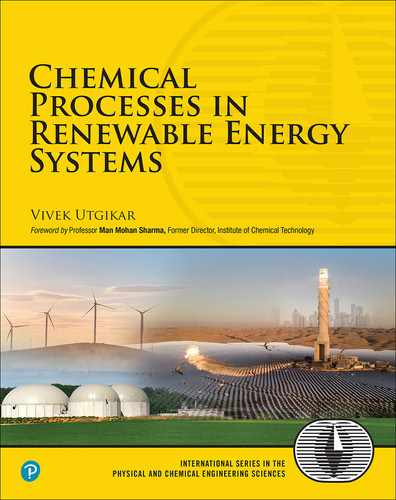Renewable Energy Technology for Engineers: Principles, Generation, Storage, Economics, and More The future requires substantial growth in renewable energy systems in order to address carbon emissions and climate change, while still improving human life. To meet this challenge, many engineers and other technical professionals need new theoretical and practical knowledge, including greater familiarity with current and emerging renewable technologies. In Chemical Processes in Renewable Energy Systems, Dr. Vivek Utgikar introduces the fundamental principles, transformations, and applications associated with each leading form of renewable energy. Writing for engineering students and practitioners, Utgikar covers solar, biomass, hydro, wind, ocean, and geothermal energy, as well as hybrid systems that integrate generation with storage. He also introduces essential principles of techno-economic analysis, to clarify issues that will continue to inform policy concerning renewable energy systems. Utgikar discusses state-of-the-art, recent developments, as well as enduring scientific and technological principles and transformations, and provides complete references to encourage deeper exploration. The resulting text will help you quickly get up to date and then stay up to date as technological, social, and economic factors evolve. Understand energy's role in society, the limits and risks of fossil sources, and renewable alternatives Compare the leading forms of primary renewable energy and the transformations they make possible Learn how concentrated solar power (CSP) and photovoltaic (PV) systems improve solar energy utilization Explore complex transformations of biomass energy into electricity, heat, and fuel chemicals Optimize transformations in renewable systems that are primarily mechanical and thermal, such as hydro, wind, ocean, and geothermal Consider engineering issues associated with hybrid systems that combine generation with batteries or other forms of storage Apply principles of techno-economic analysis to renewables to make better policy or business decisions For students, this guide will illuminate both the technical principles and policy perspectives influencing the move to renewables. For practitioners, it offers a refresher and ready reference to implement any renewable energy system, now and in the future. Register your book for convenient access to downloads, updates, and/or corrections as they become available. See inside book for details.
Table of Contents
- Cover Page
- About This eBook
- Halftitle Page
- Title Page
- Copyright Page
- Dedication Page
- Contents
- Foreword
- Preface
- Acknowledgments
- About the Author
- Chapter 1 Introduction to Energy Systems
- Chapter 2 Renewable Energy Sources
- Chapter 3 Transformations and Chemical Processes in Solar Energy Systems
- Chapter 4 Transformations and Chemical Processes in Biomass Energy Systems
- Chapter 5 Transformations and Chemical Processes in Mechanical, Geothermal, and Ocean Energy Systems
- Chapter 6 Hybrid Energy Systems
- Chapter 7 Techno-Economic Analysis of Renewable Energy Systems
- Epilogue The Path Forward
- Appendix A Conversion Factors and Constants
- Appendix B Thermodynamic Power Cycles: A Primer
- Index
